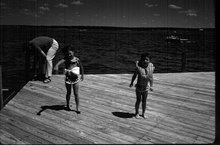
…alas, but that is what we are. Does the infinite space
we dissolve into, taste of us then?
--Rainer Maria Rilke, The Second Elegy
"how...do you prepare yourself, all alone, to enter an extraordinary state on an ordinary morning? How to set yourself spinning? Where is an edge— a dangerous edge— and where is the trail to the edge and the strength to climb it?"
Not sure exactly where this is going, I only reserve trust in the vague inkling that it leads somewhere out of the desolation of late. Encountering some phrases in Tinker Creek, not just phrases, but passages that tickle a far-off memory of an idea that had held me in its sway many years ago. I was writing a paper about a dramatic work by friend and utter-literary and musical genius, Jo Carol Pierce’s Bad Girls Upset by the Truth striving to place it within the context of an intuitive feminist theology. If you don’t know the play, many reviews reveal the basic plot, but its real power is in the language and Pierce’s hypnotic West Texas voice reciting such perplexingly provocative lines as emerge in the song Loose Diamonds (which is what he was singing in the play when I fell in love with his voice). I happened upon a book that served up the academic main course of the argument, Extravagant Affection: A Feminist Sacramental Theology, by Susan Ross, but the rest was fleshed out in numinous urges toward other work that had impressed me, perhaps none more pointedly than the film Breaking the Waves, for which it was hard to locate a willing viewing partner. I was completely in its thrall. That the protagonist had entered into some sort of self-annihilating bargain with the creator to save her husband is hauntingly portrayed.
I am against the rehearsed approach to [g]od. I am wholeheartedly for the fumbling, oblique, heart-wrenching one, or the irreverent, profane, and honest one. But perhaps more interesting than our hacking away at the body of evidence or lack of for or against a greater meaning, is the simple awe for the ultimate extravagant gesture, creation.
The point about being, as I know it here and see it, is that, as I think about it, it accumulates in my mind as an extravagance of minutiae….Van Gogh, as you remember, called the world a study that didn’t come off. Whether it “came off” is a difficult question. The chloroplasts do stream in the leaf as if propelled by a mighty, invisible breath; but on the other hand, a certain sorrow arises, welling up in Shadow Creek, and from those lonely banks it appears that all our intricate fringes, however beautiful, are really the striations of a universal and undeserved flaying. But, Van Gogh, a study it is not. This is the truth of the pervading intricacy of the world’s detail: the creation is not a study, a roughed-in sketch; it is supremely, meticulously created, abundantly, extravagantly, and in fine.
--Dillard, PaTC (134)



